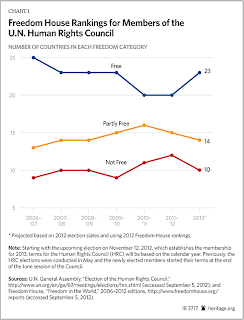The African Union’s decision to nominate Sudan for the United Nations Human Rights Council (HRC) elicited justifiable outrage. Pressure from human rights groups and governments led Kenya to announce its own election bid, causing Sudan to withdraw. This was a welcome development; the notion of the genocidal government sitting on the most visible U.N. human rights body was outrageous. However, notorious human rights violators like Cuba, China, and Russia currently sit on the Council; and even after Sudan’s withdrawal, other African countries with dismal human rights records remain virtually assured of election.
The lack of membership standards is a key reason behind the Council’s poor record and, sadly, there is little chance for establishing such standards. The Administration’s current strategy of focusing limited diplomatic capital on annually blocking a particularly egregious country while other, only slightly less objectionable states win election is a losing game. Instead of lending credibility to this flawed institution, the U.S. should seek to eliminate it and work to establish a more effective human rights body with rigorous membership standards.
Sudanese Candidacy: Emblematic of Fundamental Flaws
Sudan has a repressive government accused of massive human rights violations, including genocide in Darfur and brutally repressing ethnic and religious minorities in other parts of the country. Sudan deserves intense scrutiny by the Council; it should not be passing judgment on other state’s records as a HRC member.
Nonetheless, until Kenya announced its decision to run, Sudan was nearly certain to win a seat on the Council. This was due to the absence of meaningful membership standards provided by the General Assembly when it established the HRC:
- Council members must be U.N. member states.
- The 47 Council seats would be allocated by regional group: 13 for Africa; 13 for Asia; 6 for Eastern Europe; 8 for Latin America and the Caribbean; and 7 for Western Europe and other states (WEOG).
- Countries would be elected by secret ballot and must receive an absolute majority in the General Assembly (97 out of 193 countries). Conversely, it takes a two-thirds vote (129 votes) to “suspend the rights of membership in the Council [for] gross and systematic violations of human rights.”
- Countries would be elected for three-year terms, with a third of the seats being elected annually. Countries may serve a maximum of two consecutive terms (six years), after which they “shall not be eligible for immediate re-election,” and have to wait at least one year before seeking another term.
- Countries were urged to “take into account the contribution of candidates to the promotion and protection of human rights and their voluntary pledges and commitments made thereto.” However, this is not mandatory.
Because there are no meaningful human rights standards, any country—even those with deplorable records like Sudan—are eligible. Regional groups frequently game the system to facilitate their candidacies by offering the same number of candidates as there are open seats. This practice, referred to as offering a “clean slate,” maximizes the chances for each candidate to receive the 97 vote majority necessary to win a seat.
This was the situation before Kenya was convinced to run by human rights groups and governments opposed to Sudan’s candidacy. The Africa Group offered five candidates for the five open African seats on the Council. With only five candidates for five seats, Sudan was a virtual lock to win. When Kenya entered, the African slate became competitive.Sudan decided to withdraw shortly after, likely to avoid the embarrassment of losing.
Sudan’s withdrawal is obviously positive. However, none of the 2013 African candidates have good human rights records. Freedom House ranks Cote d’Ivoire, Gabon, and Ethiopia as “not free,” and Sierra Leone and Kenya as merely “partly free.” Thus, even though Sudan has withdrawn, when combined with previously elected countries the African group will be represented on the Council in 2013 by seven “not free” countries (more than in any previous year), four “partly free” countries, and only 2 “free” countries.
Deficiencies in membership are one of the key reasons behind the Council’s fundamental shortcomings: bias against Israel, willful inattention to serious human rights situations, and a weak and politicized Universal Periodic Review (UPR). The lack of meaningful membership standards are likely permanent after nearly all of the substantive reform proposals—including U.S. proposals establishing stronger criteria for candidates and requiring regions to offer competitive slates—were rejected during the 2011 review.
Bereft of institutional filters, those opposed to human rights violators being elected to the HRC are forced to mount annual campaigns hoping to block their election. But not every unworthy candidate can be the focus of such an effort, thus only the most egregious are targeted each year while the slightly less awful candidates win election. The 2013 candidates likely to win election with poor to terrible human rights records are: Cote d’Ivoire, Ethiopia, Gabon, Kazakhstan, Kenya, Pakistan, Sierra Leone, United Arab Emirates, and Venezuela.
2013: A Brief Window of Opportunity
Africa is not the only region to offer a clean slate to ensure that countries with poor human rights records have greater chances of winning a seat on the Council. Every region except WEOG has offered the same number of candidates as vacancies in 2013. This situation, along with the fact that Freedom House ranks all five WEOG candidates (for three vacancies) as “free,” makes projecting the human rights composition of the Council for 2013 simple: the number of “free” countries should increase from 20 to 23 and the number of “not free” countries should decrease from 12 to 10.









No comments:
Post a Comment